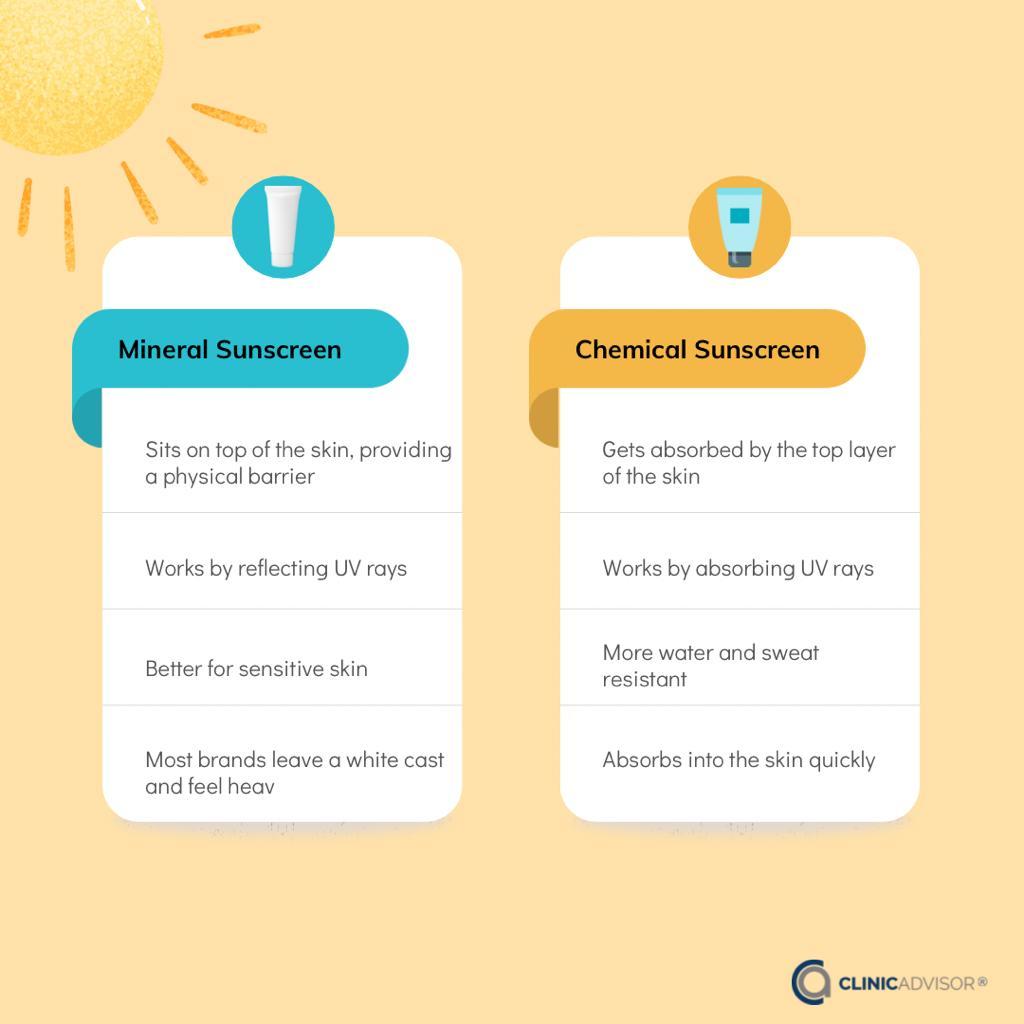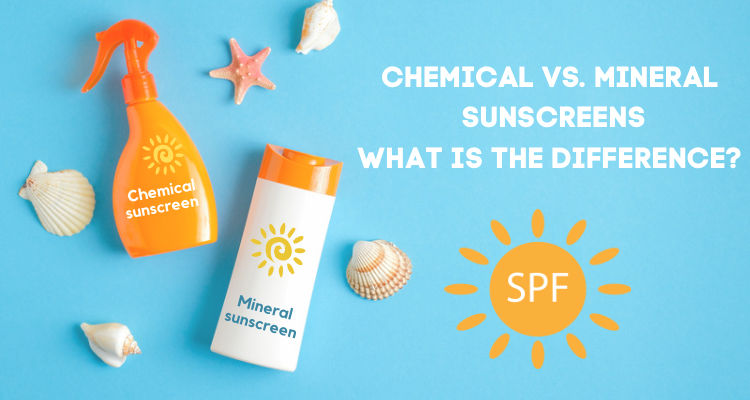In the skincare game, wearing sunscreen is the rule we all live by—it's our best defense against the sun's harsh UV rays. But when you're staring down the sunscreen aisle, trying to pick between mineral and chemical types, it gets a bit tricky. We're diving into the differences between chemical and mineral sunscreens, breaking down the good, the bad, and everything in between to help you make a choice that's right for your skin.
Key Takeaways:
|
1. What is Mineral (Physical) Sunscreen?
Mineral or physical sunscreens (aka inorganic sunscreens) use active mineral ingredients as UV filters like zinc oxide or titanium dioxide to create a physical barrier on the skin's surface. This barrier reflects and scatters UV radiation away from the skin, offering protection against sunburn and skin damage. Unlike chemical sunscreens, which absorb UV rays and transform them into heat, mineral sunscreens block the rays before they can penetrate the skin. They're often recommended for sensitive skin due to their lower risk of irritation.
Pros of Physical/Mineral Sunscreen:
- Immediate protection upon application, unlike chemical sunscreens, may require about 20 minutes to become effective.
- Less likely to cause skin irritation, making them suitable for sensitive skin types.
- Provides protection against the full spectrum of UVA and UVB rays due to the reflective properties of zinc oxide and titanium dioxide.
- Tends to be more resistant to water and sweat compared to chemical formulas.
- Less likely to clog pores, beneficial for acne-prone skin.
- Can be friendly to the coral reefs.
Cons of Mineral Sunscreen:
- Often leaves a white cast on the skin, which can be particularly noticeable on deeper skin tones.
- Can be thicker and more difficult to spread evenly across the skin.
- May need more frequent reapplication, especially if it's rubbed off or if you sweat heavily.
- Some formulations can be less water-resistant, requiring careful selection for water activities.
- Can be more expensive than chemical sunscreens.
2. What is Chemical Sunscreen?
Chemical sunscreens (aka organic sunscreens) contain organic (carbon-based) compounds as UV filters, such as oxybenzone, avobenzone, octisalate, octocrylene, homosalate, and octinoxate. These compounds absorb UV radiation, converting it into heat, which is then released from the skin. This type of sunscreen is typically easier to apply without leaving a white residue, making it popular for daily use. Chemical formulas can offer broad-spectrum protection and tend to be more lightweight and less noticeable on the skin

Pros of Chemical Sunscreen:
- The Light Consistency: Chemical sunscreens present themselves with a lighter demeanor, gracefully gliding onto the skin and bestowing a featherweight experience. An ideal companion for daily wear.
- The Aesthetic Elegance: Immaculate in their absorption, these sunscreens meld seamlessly with the skin's canvas, leaving behind no trace of residue or the ubiquitous white cast.
Cons of Chemical Sunscreen:
- Sensitivity: The orchestra of chemical compounds may sometimes strike a discordant note with sensitive skin, inducing irritation or allergic reactions in susceptible individuals.
- Absorbing the Sun's Warmth: Chemical sunscreens possess a unique talent of transmuting UV radiation into heat. For those inclined towards heat sensitivity, this might invoke discomfort.
3. How to Decide between Mineral and Chemical sunscreens?
Deciding between mineral and chemical sunscreens involves considering skin type, lifestyle, and personal preference.
When choosing sunscreen, consider these nuanced factors:
- For sensitive skin, mineral sunscreens are a kinder choice due to their gentle formulation. They're known for their durability, providing robust protection without breaking down easily in sunlight.
- Environmentally conscious individuals may prefer mineral options to avoid ingredients harmful to marine ecosystems, like oxybenzone and octinoxate.
- Finally, the texture and how the sunscreen feels on your skin are crucial for comfortable daily wear, guiding you toward a product that meshes well with your personal care routine.
4. Safety of Chemical and Mineral Sunscreens
Safety echoes as the symphony's principal motif in the realm of sunscreens. Both mineral and chemical variants undergo rigorous trials and tests to secure their place as trusty companions in the battle against the sun. Furthermore, a spotlight shines on the environmental stakes, with studies drawing attention to the ecological risks associated with specific chemical sunscreen ingredients, shedding light on the potential harm they can inflict upon delicate coral reef ecosystems.
5. The Path of Informed Decisions
To make an informed decision between mineral and physical sunscreens, consider skin sensitivity, environmental impact, desired texture, and effectiveness.
- Mineral sunscreens are better for sensitive skin and have minimal environmental impact but may leave a white cast.
- Chemical sunscreens offer a lightweight feel and broader protection but might irritate sensitive skin, especially around the eyes.
Evaluate your priorities—skin health, environmental concerns, and cosmetic preferences—to choose a sunscreen that aligns with your values and needs.
6. What is a Hybrid Sunscreen?
Hybrid sunscreens merge the best aspects of both mineral and chemical filters, offering comprehensive UVA/UVB protection while minimizing potential drawbacks. They're designed to be more user-friendly, reducing the white cast often associated with mineral options and decreasing the risk of irritation sometimes seen with chemical formulas. This blend makes them suitable for a wider range of skin types and preferences, ensuring broad-spectrum coverage without compromising on cosmetic elegance or comfort, thus bridging the gap between the protective efficacy and aesthetic demands of sunscreen users.
Conclusion
In choosing the right sunscreen, understanding the differences between mineral and chemical formulations is key. Whether you lean towards the gentle, environmentally-friendly profile of mineral sunscreens or prefer the seamless application of chemical ones, the priority is consistent, adequate protection against the sun's harmful rays. By considering your skin's needs, lifestyle, and environmental impact, you can make an informed decision that aligns with your personal health and ethical standards. Ultimately, the best sunscreen is the one you'll use regularly and correctly, ensuring an effective shield against UV damage.
Sources:
Gilaberte, Y., & González, S. (2016). "Sun Protection and Sunscreens: A Review." Actas Dermo-Sifiliográficas, 107(5), 378-387.
Downs, C. A., et al. (2016). "Toxicopathological Effects of the Sunscreen UV Filter, Oxybenzone (Benzophenone-3), on Coral Planulae and Cultured Primary Cells and Its Environmental Contamination in Hawaii and the U.S. Virgin Islands." Archives of Environmental Contamination and Toxicology, 70(2), 265-288.



Share Your Opinion, Please